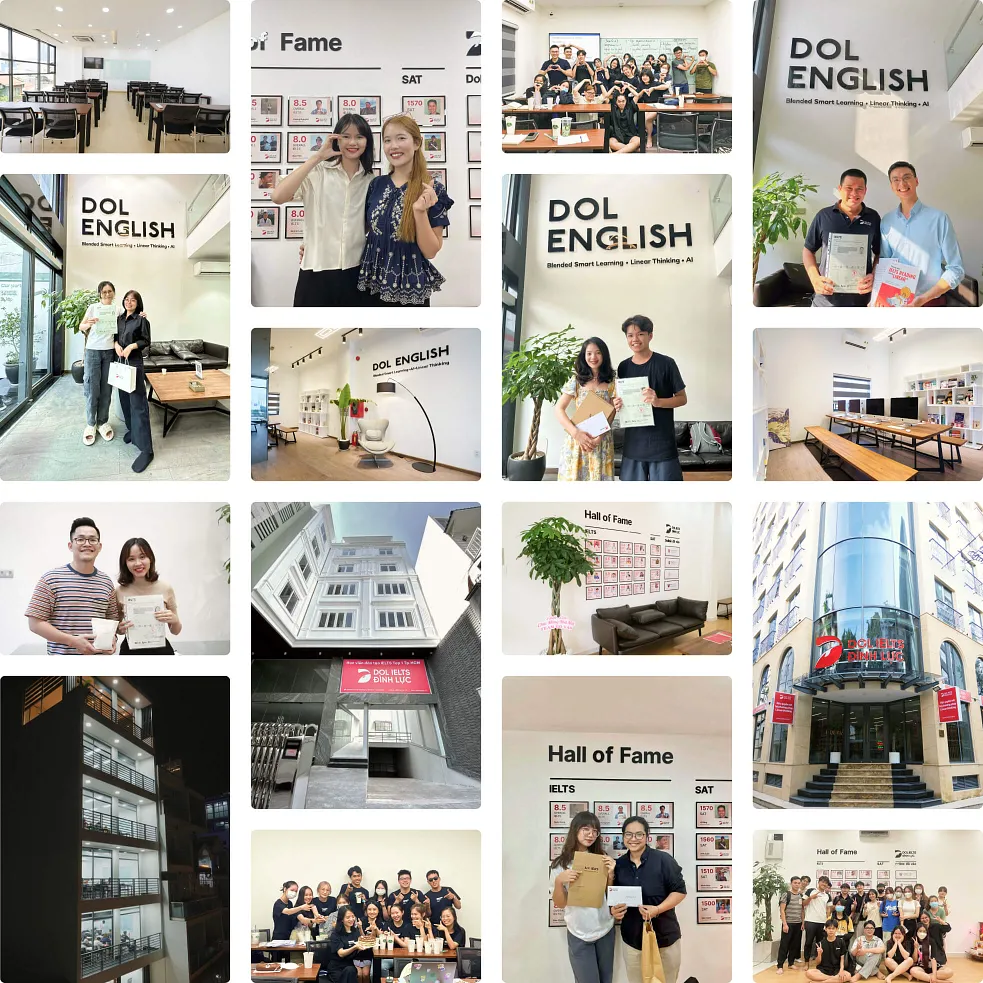Tổng hợp từ vựng cần phải học để làm tốt phần IELTS Speaking
Nhiều học viên gặp vấn đề nói ngắc ngứ trong IELTS Speaking vì vốn từ vựng còn hạn hẹp. Vì vậy, dù có ideas nhưng thí sinh lại không biết cách diễn đạt ideas đó như thế nào. Nhưng phải học từ vựng thế nào cho hiệu quả nhất cho IELTS Speaking? Chẳng lẽ cứ đâm đầu vào học thuộc sample answer? Bài viết dưới đây sẽ hướng dẫn cụ thể cho thí sinh cách học từ vựng cho IELTS Speaking một cách hiệu quả nhất, áp dụng tư duy Linearthinking.
DOL IELTS Đình Lực
Oct 25, 2022
2 mins read

Table of content
Phương pháp học từ vựng cho IELTS Speaking
Cách cũ
Cách của DOL
Từ vựng IELTS Speaking theo chủ đề
Topic: Fruit and Vegetables
Topic
Topic: ADVERTISING
Phương pháp học từ vựng cho IELTS Speaking
Cách cũ
Trước giờ khi học từ vựng cho IELTS Speaking, nhiều học viên vẫn còn học theo cách cũ: liệt kê từ vựng từ trên xuống dưới. Ví dụ muốn học từ vựng cho chủ đề Technology thì thí sinh thường hay liệt kê ra những từ như:
Computer buff : chuyên gia máy tính
Back up your work: lưu trữ thông tin, tập tin
Technophobe : người không thích công nghệ mới
Technophile : người mê công nghệ
technological advances: những tiến bộ trong công nghệ
Surf the web: lướt web
Social networking sites: mạng xã hội như
Forward the message: chuyển tiếp tin nhắn
Harness technology : sử dụng công nghệ
Online banking: ngân hàng trực tuyến
…
=> Cách học này thiếu tính hệ thống, vì vậy rất khó để nhớ từ vựng. Chưa kể vì không hệ thống hoá nên nếu học theo cách này thì mỗi lần muốn sử dụng phải “lục tung" trí nhớ thì mới nhớ mà xài được.
=> Ảnh hưởng Fluency and Coherence
Cách của DOL
Thay vì liệt kê từ vựng theo cách ngẫu nhiên, DOL hướng dẫn học viên sắp xếp và hệ thống hoá từ vựng theo các mental model (mô hình tư duy trong đầu). Những mental model thường dùng nhất trong Speaking gồm:
Mô hình What-Where-When-How-Why
Mô hình Timeline (Before - During - After)
Mô hình Advantages - Disadvantages
Mô hình Problems - Causes - Solutions
…
Cách học theo mental model giúp học viên dễ nhớ kiến thức hơn, đồng thời khi cần có thể truy xuất kiến thức và sử dụng được ngay, góp phần tăng Fluency khi nói.
Cùng quan sát thử ví dụ cho một vài chủ đề nhé:
Từ vựng IELTS Speaking theo chủ đề
Topic: Fruit and Vegetables
Để hệ thống hoá từ vựng chủ đề này, học viên có thể dùng mental model What - Where - When - How - Why
What: Các loại rau củ quả có thể ăn
Why: Lí do nên ăn rau củ quả
How: Nên ăn rau củ quả như thế nào
When: Nên mua rau củ quả khi nào
Where: Nên mua rau củ quả ở đâu
Có thể thấy, sau khi hệ thống hoá từ vựng, việc ghi nhớ và ứng dụng từ trở nên cực kì dễ dàng. Cùng thử áp dụng từ vựng chủ đề Fruits and vegetables vào một vài câu hỏi nhé:
How often do you eat fruits and vegetables?
=> I eat fruit and vegetables on a daily basis. I eat veggies before the main meal and then have fruits as desserts. My favourites are definitely apples and strawberries, though you really need to wash them carefully before eating.
What is the importance of fruits and vegetables in our diet?
I think they are extremely important! From what I know, eating vegetables and fruits can provide a lot of nutrients for your body, especially vitamins and minerals. It is also good for your digestion and can prevent some health problems! For people who want to avoid weight gain, it is also a good idea to eat veggies as they contain low calories compared to other types of food.
Is it easy to buy really fresh fruits and vegetables nowadays?
I find it extremely easy to purchase them. I usually get them from a local store nearby where I live since it is more convenient for me to go there. If you want to get fresh fruits then you should buy them in the morning. For people who want to get fresh fruits at cheaper prices, markets can also be a good place to go!
What kind of fruits and vegetables do people in your country enjoy?
People in Vietnam enjoy different types of fruits and veggies. I think apples and bananas are among their favourites as they are the cheapest and easiest to find. People also like tomato and potato because they have really pleasant tastes!
Cùng quan sát thử topic thứ 2 nhé:
Topic: TRAVEL
Với topic này, thay vì dùng mental model What - Where - When - How- Why, thí sinh có thể sắp xếp dựa vào mental model Timeline (Before - During - After)
Before: Trước khi đi du lịch cần làm gì
During: Trong khi đi du lịch cần làm gì
After: Sau khi đi du lịch cần làm gì
Từ vựng sau khi được sắp xếp hoàn chỉnh như sau:
Cùng áp dụng thử từ vựng này vào một câu hỏi part 2 nhé:
Describe an unforgettable trip you have had
You should say :
When and where you went
Who you went with
What you did there
And explain why you think it was enjoyable
Sample answer:
I’ve had so many memorable trips in my life but the one I remember the most is when I went to Hoi An with my family last year. I was so nervous before the trip because it was actually my first time travelling to this ancient city. My sister prepared everything for that trip. She booked a hotel and also flight tickets for the whole family. She also got travel insurance in case something unfortunate happened. She also reminded us to pack our bags early and charge our electronics. Thanks to that preparation everything went really well! We visited a lot of tourist attractions in the area and also went to the local markets. They sold a lot of different souvenirs and we bought some presents for our friends and relatives. Also, the landscapes there were breathtaking! I lost count of how many photos I had taken of the ancient houses there. My sister wanted to check out the nightlife there but my parents didn’t let us! After all it was a really enjoyable trip and we made so many memories from it.
Nhưng liệu với câu hỏi Part 3 thì có áp dụng hiệu quả cách học từ vựng này không nhỉ? Cùng quan sát thử topic thứ 3 nhé!
Topic: ADVERTISING
Với topic này, mental model được chọn để áp dụng là Advantages - Disadvantages (kết hợp với phân loại)
Cùng áp dụng thử những từ vựng học được từ mental model này để trả lời các câu hỏi Part 3 trong chủ đề Advertising:
Are advertisements a good or bad influence on children?
=> I think advertisements can be bad for children. There are so many adverts on TV nowadays it feels like children are bombarded with these ads. Many of them spend hours a day being glued to the TV screen to watch these colourful adverts, so they can't focus on their study anymore. I also think toy adverts on TV can create unnecessary demands, especially for children! Many of them watch adverts on TV and then nag their parents to buy them the toys they see. I don't think it is good for children's personality development
What are the harmful and beneficial effects of advertising?
=> Advertising can have many benefits. The first one that comes to mind is how adverts can inform customers of different products and special offers. Thanks to this information, customers can easily select the most suitable brands or products that they want according to their budget and taste. I also think advertising is a huge industry and it can create a lot of job opportunities for people. Having said that, there can be some downsides to advertising. The first I can think of is that many adverts exaggerate the quality of the products they promote to mislead customers into believing that the products are effective. Many of them aren't, though, which makes buyers very disappointed when they receive the products.
What are the different methods of advertising?
=> There are so many different ways that companies can advertise their products. One method is called outdoor advertising. As you can see when you go on the streets, there are many billboards with adverts on them. This method of advertising costs a lot of money but at the same time it can increase brand recognition effectively. Another form of advertising that I can think of is product placement, which means that you will feature your product in a movie or in a TV show. This is a smart way to market your product because it can increase your brand awareness subconsciously - it doesn't look like you're promoting anything, but you are!
What is the most popular way of advertising?
=> In the past, it used to be advertising on print media, such as newspapers or magazines, but nowadays I would say that the most popular one is social media ads. This method is gaining in popularity because it is much cheaper compared to conventional types of advertising. You can post on social media without any costs or fees and even putting adverts on these sites is more cost-effective than placing adverts on traditional newspapers. It is also easier for marketers to reach a target audience since you can tailor your social media adverts to reach a specific age group or people with specific preferences. So all in all this method is more economical and effective, which I think is the reason why it is so popular.
Tóm lại, bài viết trên hướng dẫn học viên cách học từ vựng thông minh hơn trong Speaking, tập trung vào hệ thống hoá và sắp xếp từ vựng theo mental model thay vì cắm mặt vào học từ theo kiểu liệt kê như trước. Tuy nhiên ngoài học từ vựng thì để tiến bộ Speaking thí sinh cũng cần có khả năng nghĩ và phát triển ý hợp lý. Cùng tìm hiểu thử cách áp dụng Linearthinking trong Speaking qua bài viết này nhé! #Link 7 Linearthinking trong Speaking
Table of content
Phương pháp học từ vựng cho IELTS Speaking
Cách cũ
Cách của DOL
Từ vựng IELTS Speaking theo chủ đề
Topic: Fruit and Vegetables
Topic
Topic: ADVERTISING

